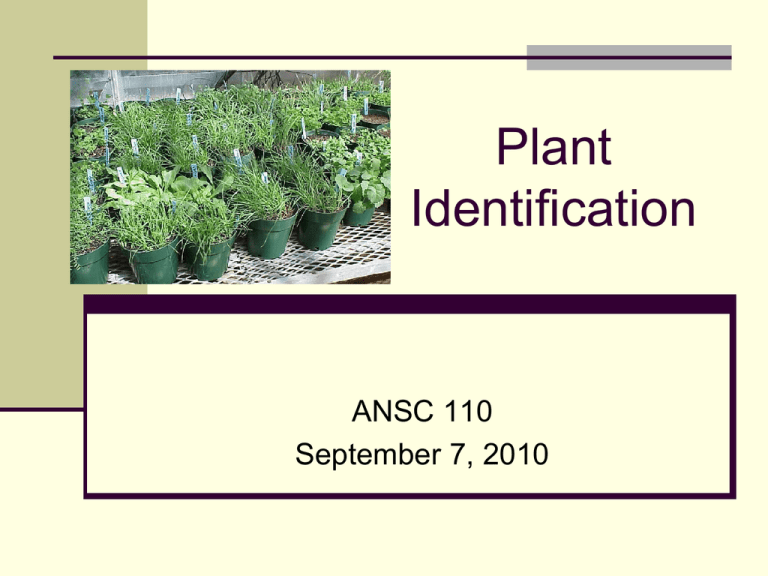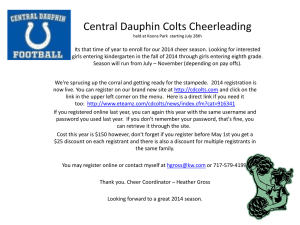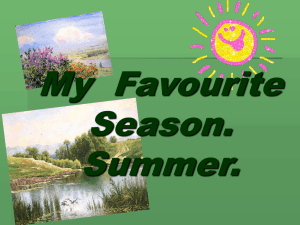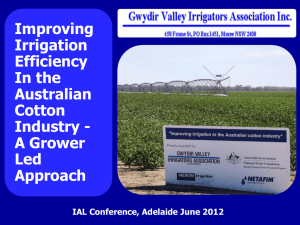Plant Identification
advertisement

Plant Identification ANSC 110 September 7, 2010 What Defines a “Good” Pasture Species? Palatable* Nutritious Dense growing Hearty (recovers well) Tolerant to climatic extremes Resistant to pests Forage Classification GRASSES Perennials LEGUMES Perennials Cool Season Cool Season Warm Season Warm Season Annuals Annuals Cool Season Cool Season Warm Season Warm Season Plant Vocabulary Grass: monocots (one seed leaf) herbaceous plant parallel leaf veins fibrous root system bear seed on an elongated seed stalk Legume: dicots (two seed leaves) “netted” leaf veins usually have a taproot produce seed in a pod nitrogen fixation Grass or Legume? http://aggie-turf.tamu.edu/aggieturf2/grasswee/grasses/kblue.htm http://forages.oregonstate.edu/media_library/alfalfa/screen/39.jpg Plant Vocabulary Annual: A plant that germinates, grows, reproduces, and dies in one growing season Perennial: A plant that has the ability to live for more than one year Biennials – weak perennials that usually die after the second growing season Plant Vocabulary Warm Season Plants: plants that begin growth and/or are planted in the spring or early summer and do most of their growth during the warmest part of the year Cool Season Plants: plants that begin growth and/or are planted in the fall or early spring and do most of their growth during the coolest months of the year (except during winter) Grasses About 40 species commonly used for pastures Monocots (monocotyledons) Identification: Parts of the plant Inflorescence Root system Color Growth habit Grasses – Plant Parts Parts of the stem (culm) Node – solid joint of a grass stem where leaf sheaths are attached to stem Internode – region of the stem between the nodes Grasses – Plant Parts Parts of the leaf Blade – portion of leaf connected to the sheath Sheath – surrounds the stem above the node where it is attached Collar – region at the junction of the sheath and blade Ligule – appendage that clasps the stem where the sheath and blade join Auricle – outgrowths from the base of the blade Collar Region - Ligule Fringed/Hairy Photos © University of California, IPM project Truncated/Short Absent Membranous Toothed Rounded Tapered Collar Region - Auricles Underdeveloped Absent Claw-like Rounded Photos © University of California, IPM project Collar Region - Sheath Closed Overlapping Split Photos © University of California, IPM project Plant Characteristics Inflorescence (plant head, seed, flower/fruit) Panicle – many branches Spike – unbranced axis Raceme – spikelets on one branch Awns – appendage on ends of seeds Length, number Types of Inflorescences Awns Annual Ryegrass AWNS Perennial Ryegrass NO AWNS Plant Characteristics - Roots Root System Rhizomes Stolons Fibrous Root System Fibrous - Rhizomes Fibrous - Stolons Photos © University of California, IPM project Fibrous - Bunchgrass Taproot Plant Characteristics - Color Orchardgrass Bermudagrass http://forages.oregonstate.edu/ Plant Characteristics - Leaf growth Folded Rolled Common Characteristics of Some Pasture Species GRASSES Timothy Phleum pratense Cool season perennial Medium height Haplocorm in mature plants Leaf blades are rolled Gently ribbed upper, smooth under Seedhead = compact panicle No auricles Pointed or rounded ligule Round sheath Timothy Seedheads of timothy grass Orchardgrass Dactylis glomerata Cool season perennial Tall-growing, bunch grass No rhizomes or stolons Folded leaf blades Sheath flattened No auricles Membranous ligule Seedhead - clustered spikelet; seeds are slightly curved Orchardgrass Seedheads Folded Leaf Blades Kentucky Bluegrass Poa pratensis Cool season perennial Short - medium height, sodforming (rhizomes) Folded leaves Boat-shaped tips Green/Dark green in color No auricles Collar sometimes hairy Membranous ligule Seedhead - open pyramidal panicle Kentucky Bluegrass… Tall Fescue Collar of tall fescue Festuca arundinacea Cool season perennial Bunchgrass (short rhizomes) Coarse, tough roots Ribbed leaves (serrated edges) Auricles blunt with fine hairs Short membranous ligule Seedhead = branched panicle with elliptical spikelets Seeds have a short awn Tall fescue… Reed Canarygrass Phalaris arundinacea Leaves rolled No auricles Collar may be divided Large membranous toothed ligule, sometimes hairy on back Wide leaf blade, smooth Seedhead - densely flowered, spreading to narrow panicle Reed Canarygrass Crabgrass Digitaria sanguinalis Warm season annual Reaches 2-4 ft. in height Creeping grass, long runners Wide leaves hairy at base Rolled leaves Stiff ligule Seedhead - 4-6 spikes at top of stems (Winter) Wheat Triticum aestivum Cool season annual Rolled leaves Round, smooth split sheath Broad collar Small hairy auricles Membranous ligule Long rounded blades Seedhead - Crowded thick spike, long awns Wheat… Smooth Bromegrass Bromus inermis Cool season perennial Sod-forming (deep-rooted rhizomes) Blades narrow No auricles Ligule – membranous, truncate to rounded Round sheath Seedhead - Open panicle; 5 to 11 florets per spikelet 'W'-shaped constriction at approximately the midpoint of the leaf blade. Smooth Bromegrass Annual Ryegrass Lolium multiflorum Cool season annual Bunch grass High palatability and digestibility Rolled leaves, prominently ridged on upper surface; smooth glossy and hairless on under surface Claws on auricle Membranous ligule sometimes with hairs Seedhead - solitary spike with alternately arranged spikelets; seeds have awns Annual Ryegrass Perennial Ryegrass Lolium perenne L. Cool season perennial Good for erosion prevention Quick to establish Undersurface of leaves is shiny dark green leaves are folded Inflorescence stems are nearly naked Seedhead - spikes with spikelets growing edgewise to seedhead stem; No awns Perennial Ryegrass Bermudagrass Cynodon dactylon Warm season perennial Good for erosion control (sodforming) May become invasive Spreads by rhizomes, stolons and seed Stems are short-jointed Leaves are flat and spreading Leaves may be hairy or smooth Seedhead = two rows of spikelets on finger-like spikes White collar region with sparse, relatively long hairs Bermudagrass Common Characteristics of Some Pasture Species LEGUMES Legumes Dicot plants Two seed-bearing leaves Legume roots host Rhizobium bacteria Often have taproots Trifoliate leaves Shape of leaflets Texture (hairy, shiny, etc.) Legume – Plant Parts Petiole – the stalk by which a leaf is attached to the stem (leafstalk) Stipules – a pair of leaf-like outgrowths / appendages that occur at the base of the petiole Stolons – shoot that bends to the ground or that grows horizontally above ground Legume Plant Parts Inflorescence – Legumes/ Weeds Alfalfa Medicago sativa Cool-season perennial 15-25 inches tall Pinnately trifoliate leaves arranged alternately on the stem Leaves are toothed towards the tips Slender stipules fused to the petiole Flowers - generally pinkpurple, but may be white or yellow Alfalfa… Ladino Clover Trifolium repens Giant form of white clover Cool season perennial Spread by stolons 8-12 inches tall Tri-foliate leaves, shiny underneath, often marked with v-shaped pattern Flower - White ball-shape Ladino Clover… Red Clover Trifolium pratense Cool season perennial Hairy leaves and stems Erect – grows 2-3 feet tall Large leaves, prominent v-shaped water mark Flower - pinkish-violet in dense clusters Red Clover… Birdsfoot Trefoil Crown Vetch Crimson Clover Sericea Lespedeza USEFUL WEBSITES http://www.caf.wvu.edu/~forage/Tutorial/forindx.htm West Virginia University – NRCS Forage Identification Slide Set http://plants.nrcs.usda.gov/cgi_bin/topics.cgi?earl=characteristics.html USDA Plants Fact Sheets Database Click on Fact Sheets and Plant Guides on left column http://www.agry.purdue.edu/ext/forages/index.html Purdue Forage Information (great photos!) http://www.ca.uky.edu/agc/pubs/agr/agr175/agr175.htm Forage Identification and Use Guide (Univ. of Kentucky)





